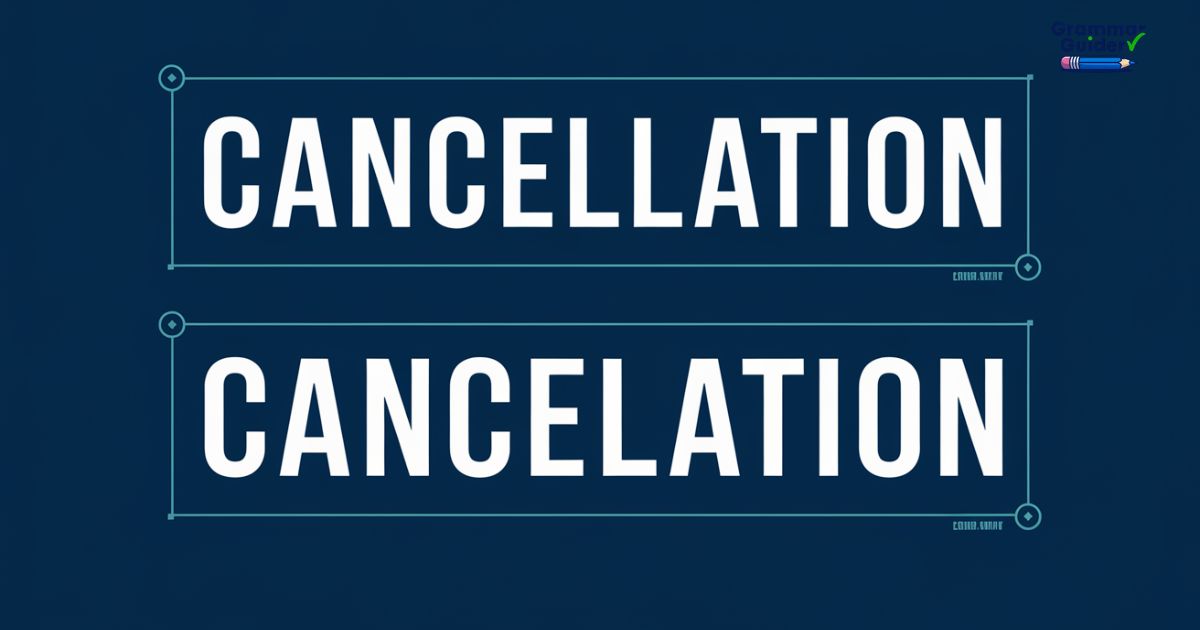When it comes to English spelling, there are often variations that can lead to confusion, especially when it comes to words like cancellation and cancelation. While both spellings are used in different parts of the world, understanding when and why each form is correct can help clarify any confusion. In this article, we’ll explore the spelling variations of cancellation and cancelation, providing you with usage examples, the word origins, and which spelling is preferred in American English versus British English.
Understanding the Difference: Cancellation vs Cancelation
The most significant difference between cancellation and cancelation lies in their spelling, specifically in the use of a double “l” versus a single “l”. The word cancellation is the preferred form in British English, while cancelation is more commonly used in American English. However, both words essentially have the same meaning and can be used interchangeably depending on your location.
For example, if you’re writing in the UK or for a British audience, it’s best to use the traditional spelling of cancellation. On the other hand, if you are writing for an American audience or in the United States, you may use cancelation, which follows the more simplified spelling approach introduced by Noah Webster, the influential American lexicographer known for advocating spelling reforms.
Word Origins: Tracing the Roots of Cancellation and Cancelation
Both cancellation and cancelation come from the Latin word cancellare, which means “to make something invalid” or “to cross out.” The double “l” form of the word, cancellation, has been used for centuries, with roots in Old French, where it was spelled similarly. Over time, the word evolved in English, and the spelling with a single “l”, cancelation, became popular in American English as part of the broader trend of simplifying spellings of many words.
Noah Webster, in his 1828 dictionary, played a crucial role in shaping American English spelling conventions. He believed that spelling should be simpler and more phonetic. For example, in his reform, he advocated for dropping double “l” in words like cancelation and traveling to make them easier to spell and pronounce. This led to the rise of cancelation in American English and is still the preferred spelling today.
The Impact of Language Differences: British vs American English
One of the major differences between American English and British English is in spelling. While both variations of the English language share a common root, the influence of historical events and linguistic reforms has led to significant differences in spelling rules. British English often follows traditional spelling, which includes double letters like in cancellation, while American English has adapted to a more simplified spelling approach.
British English: Preferred Spelling of Cancellation
In British English, cancellation is the preferred spelling. This follows the historical, traditional spelling conventions of the language. For example, if you were sending an email to a colleague in London regarding the cancellation of a meeting, you would write:
Subject: Meeting Cancellation
Dear Sarah,
I am writing to inform you that the meeting scheduled for tomorrow has been canceled due to unforeseen circumstances. Please let me know if you would like to reschedule.
Kind regards,
John
Here, the spelling cancellation is used because the message is directed to a British audience. In this context, using the correct spelling shows your attention to detail and respect for the language conventions of your audience.
American English: Using Cancelation in Professional Writing
In contrast, when writing for an American audience, you would use cancelation as the correct spelling. Take the following example where you are communicating about a meeting in a business context:
Subject: Cancelation of Meeting
Dear Noah,
I regret to inform you that the meeting scheduled for tomorrow has been cancelled. We will notify you about a new time and date shortly.
Best regards,
Emily
Here, cancelation is the correct form according to American English spelling rules. The choice of spelling reflects the intended audience and aligns with American spelling conventions.
Spelling Rules: Should You Use Cancellation or Cancelation?
British English vs American English
- British English: Use cancellation with a double “l”.
- American English: Use cancelation with a single “l”.
These are the spelling rules you need to follow depending on the region you are writing for. Understanding these rules can help you avoid spelling confusion and ensure writing consistency.
The Double “L” Spelling in British English
In British English, the double “l” in cancellation follows the pattern of words like travelling and cancelled. The reasoning is that these words derive from older forms of English where the double “l” was used more consistently.
The Single “L” Spelling in American English
In American English, words like cancelation reflect Noah Webster’s push for simplified spelling. Webster believed that dropping extra letters would make spelling more logical and phonetic, so he championed this simplified spelling approach.
Common Synonyms for Cancellation
If you’re ever unsure about using cancellation or cancelation, here are some synonyms you can use instead:
- Termination
- Annulment
- Reversal
- Rescission
- Revocation
These alternatives may help add variety to your writing, especially in professional writing or formal communication. For example, if you’re communicating about the cancellation of a service, you might say:
“We regret to inform you of the termination of your service effective immediately.”
This helps maintain writing consistency and avoids repetition.
Addressing Spelling Confusion and Grammar Rules
One common source of spelling confusion is knowing which form to use, particularly when there are language differences between British and American English. In many cases, understanding grammar rules and language conventions can help you choose the right form.
If you’re working in a professional setting, always consider your audience. If you are writing for a global audience, it might be helpful to adopt a more neutral or consistent spelling style. However, when writing for a specific regional audience, like a British or American client, using the appropriate spelling will ensure that your message is received clearly and correctly.
Table: Cancellation vs Cancelation
| Region | Preferred Spelling | Examples |
|---|---|---|
| British English | Cancellation | “The cancellation of the event” |
| American English | Cancelation | “The cancelation of the event” |
FAQ’s
What’s the difference between cancellation and cancelation?
Cancellation uses a double “l” in British English, while cancelation uses a single “l” in American English.
Which spelling is correct for British English?
In British English, the correct spelling is cancellation with a double “l”.
Should I use cancellation or cancelation in American English?
In American English, the correct spelling is cancelation with a single “l”.
Why do American and British English have different spellings?
Noah Webster simplified many English spellings, including cancelation, while British English kept the traditional form with double “l”.
Are cancellation and cancelation synonyms?
Yes, both words mean the same thing, referring to the act of cancelling something.
Can I use either spelling in professional writing?
It depends on your audience. Use cancellation for British audiences and cancelation for American ones.
Conclusion
whether you use cancellation or cancelation depends largely on the variation of English you are using. In British English, you should stick with the double “l” spelling, cancellation, while in American English, cancelation with a single “l” is preferred. Both words have the same meaning, so understanding the correct spelling for your audience is key.
Remember, the spelling rules vary by region, but what’s most important is writing consistency and clarity. By following the conventions of your target audience, you will ensure that your writing is not only grammatically correct but also professionally polished.

Jacob Harrison is the seasoned writer behind Grammar Insights, with over nine years of experience in the field. Passionate about language, he shares practical tips and strategies to help readers enhance their grammar and writing skills. With a friendly approach, Jacob makes learning accessible and enjoyable for everyone.

